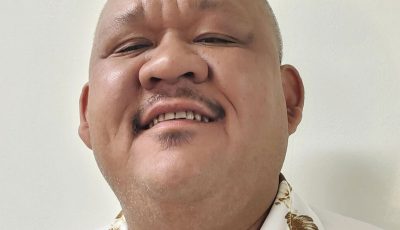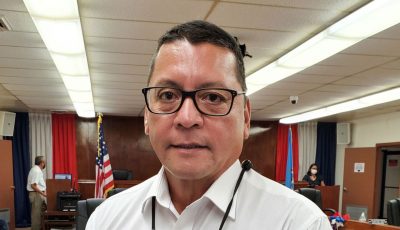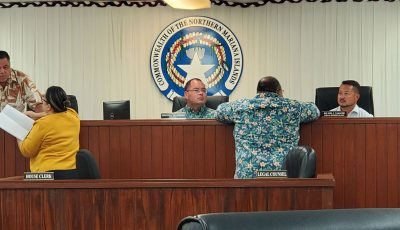Seed money found to launch local canoe and voyaging program
Seed money has been proposed as part of Gov. Ralph DLG Torres’ budget submission to the Legislature to kick start a Chamorro and Carolinian canoe voyaging program, one that would be a long time coming and the first of its kind under the Department of Community and Cultural Affairs, according to DCCA Secretary Robert Hunter.
Hunter, along with DCCA division heads, discussed their department budget with members of the House committee on fiscal affairs Thursday. The new canoe program, proposed under the Commonwealth Council for Arts and Culture, was one topic of discussion.
During the budget hearing, House fiscal chair Rep. Antonio Sablan (Ind-Saipan) pointed out a “significant increase” in full-time equivalent employees, amounting to some $205,000 in costs that would roughly increase current funding for the arts council from $217,851 to $550,211, or an increase of around $332,000.
Sablan asked for the “function” of these new employees and funding and Hunter noted that a coordinator specialist and two trade helpers were for the new canoe initiative. Hunter added this came as part of the supplemental budget, which was submitted by Torres this July.
The arts council, for its part, has zero funding from its main federal grantor, the National Endowment for the Arts, until at the earliest 2018, after failing to submit required documents and ongoing management concerns, among others.
Hunter, though, would not characterize Torres’ significant increase in funding as a “subsidy” for this loss, when asked.
“…There is a bit of it that we will use to do regular, traditional programming like exhibits, performance arts activities, and things of that nature,” he told Saipan Tribune of the funding. “A larger portion of that money is going to be used for a totally new program, canoe and navigation.”
“We want to make sure we take advantage of the people that remain, that have this base of knowledge,” he added.
Hunter noted that the Palau Community College has a navigation program as part of their credit course offerings. That hasn’t happened here, he said, though not for lack of trying with the local college. He said they want to” utilize these resources, these personnel resources,” referring to local navigators.
“These guys that are the few left doing this…bring not an accredited program but bring a similar program here to see our own people learn how to construct canoes, learn traditional navigational techniques,” he said.
It’s not only about perpetuating this important aspect to indigenous culture, he said, but it also can cause interest from around the world.
He said ancient maritime history dovetails easily and when a visitor comes to the CNMI, it should be part of their experience to see canoes, “to go and see construction of canoes.”
“We are kind of starting this program from scratch but we have a lot of good people…But the seed money is there now. This is what we need,” he said.
The DCCA secretary acknowledged that Torres expressed direct interest in starting the program, noting recent popular canoe activities from last month’s Festival of the Pacific Arts.
“This perpetuation of this very important part of both Chamorro and Carolinian culture is important to him,” Hunter said. “We’ve tried for decades for money to do this. As someone who used to run the arts council, who’s been involved in coordinating canoe voyages many years ago. For a long time, it was like pulling teeth to do these, they are costly activities.
NEA follow up
Asked for any further talks between the National Endowment for the Arts and DCCA on funding, Hunter said there was “really no give and take.”
“We need to submit some descriptive reports and wait until Jan. 22, 2018 [the next date of eligibility after grants were lost]” he said.
He said the descriptive reports would include detail financial information and others over the next year and a half with regard to staffing.
As for the financial information, Hunter said these were information that was supposed to be submitted after the grant period but weren’t.
“All of this is required before we are eligible again, even though there is a set date for that eligibility [2018], if we do not turn these materials into them, we still won’t be eligible.”
“We are just trying to get all that in order,” he said.
During the budget hearing, House vice speaker Rep. Joseph Leepan Guerrero (Ind-Saipan) inquired about the status of the grant and asked it would be reinstated.
“My greatest challenge,” arts council director Angel Hocog told lawmakers Thursday, “is having adequate staff and adequate training so we can properly bring the programs forward…so we can meet all the financial requirements that are imposed to any branch that we may in the future apply such as the NEA.”
“My greatest challenge is having the adequate staff and appropriate training,” he further noted. He also stated appreciation for former DCCA secretary Laura Ogumoro in bringing the program where it is today.
In May, NEA wrote to Torres to reiterate its stand that the arts council would be ineligible for funding from the national body up through 2018, apparently because, among other things, the council submitted its grant application using the wrong form, and because of ongoing concerns with the council’s management.
Hunter told Saipan Tribune in June that they were working to meet all of the requirements that have been set forth by the NEA and its inspector general, which includes the submission of complete reports and will address the management issues.
He said then that the NEA and especially their inspector general were not confident that federal funds would be properly managed by the art council.



























